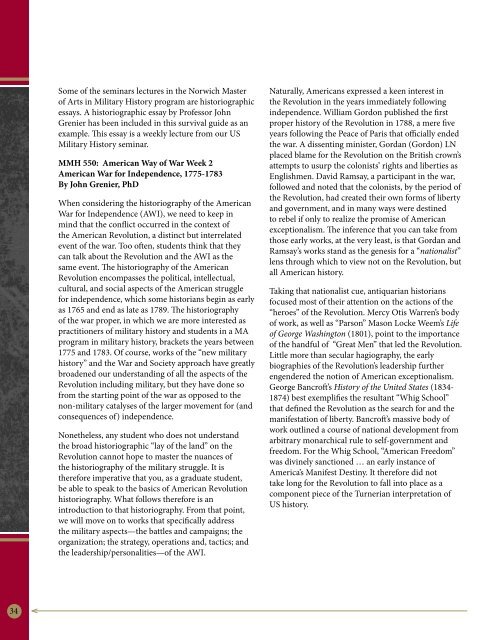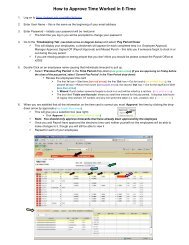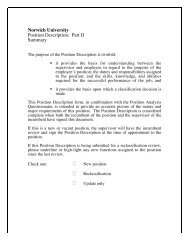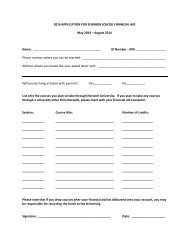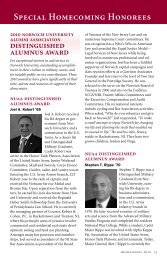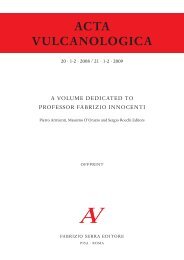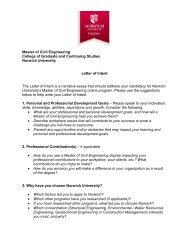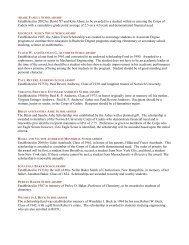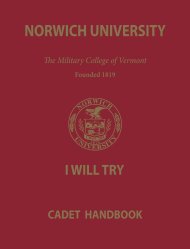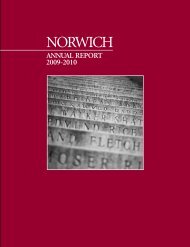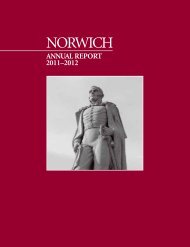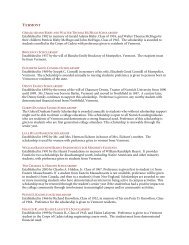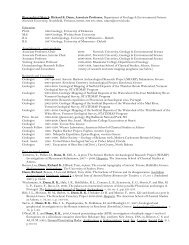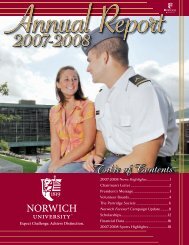Surviving Master's-Level History Programs at Norwich University: A ...
Surviving Master's-Level History Programs at Norwich University: A ...
Surviving Master's-Level History Programs at Norwich University: A ...
- No tags were found...
Create successful ePaper yourself
Turn your PDF publications into a flip-book with our unique Google optimized e-Paper software.
Some of the seminars lectures in the <strong>Norwich</strong> Masterof Arts in Military <strong>History</strong> program are historiographicessays. A historiographic essay by Professor JohnGrenier has been included in this survival guide as anexample. This essay is a weekly lecture from our USMilitary <strong>History</strong> seminar.MMH 550: American Way of War Week 2American War for Independence, 1775-1783By John Grenier, PhDWhen considering the historiography of the AmericanWar for Independence (AWI), we need to keep inmind th<strong>at</strong> the conflict occurred in the context ofthe American Revolution, a distinct but interrel<strong>at</strong>edevent of the war. Too often, students think th<strong>at</strong> theycan talk about the Revolution and the AWI as thesame event. The historiography of the AmericanRevolution encompasses the political, intellectual,cultural, and social aspects of the American strugglefor independence, which some historians begin as earlyas 1765 and end as l<strong>at</strong>e as 1789. The historiographyof the war proper, in which we are more interested aspractitioners of military history and students in a MAprogram in military history, brackets the years between1775 and 1783. Of course, works of the “new militaryhistory” and the War and Society approach have gre<strong>at</strong>lybroadened our understanding of all the aspects of theRevolution including military, but they have done sofrom the starting point of the war as opposed to thenon-military c<strong>at</strong>alyses of the larger movement for (andconsequences of) independence.Nonetheless, any student who does not understandthe broad historiographic “lay of the land” on theRevolution cannot hope to master the nuances ofthe historiography of the military struggle. It istherefore imper<strong>at</strong>ive th<strong>at</strong> you, as a gradu<strong>at</strong>e student,be able to speak to the basics of American Revolutionhistoriography. Wh<strong>at</strong> follows therefore is anintroduction to th<strong>at</strong> historiography. From th<strong>at</strong> point,we will move on to works th<strong>at</strong> specifically addressthe military aspects—the b<strong>at</strong>tles and campaigns; theorganiz<strong>at</strong>ion; the str<strong>at</strong>egy, oper<strong>at</strong>ions and, tactics; andthe leadership/personalities—of the AWI.N<strong>at</strong>urally, Americans expressed a keen interest inthe Revolution in the years immedi<strong>at</strong>ely followingindependence. William Gordon published the firstproper history of the Revolution in 1788, a mere fiveyears following the Peace of Paris th<strong>at</strong> officially endedthe war. A dissenting minister, Gordan (Gordon) LNplaced blame for the Revolution on the British crown’s<strong>at</strong>tempts to usurp the colonists’ rights and liberties asEnglishmen. David Ramsay, a participant in the war,followed and noted th<strong>at</strong> the colonists, by the period ofthe Revolution, had cre<strong>at</strong>ed their own forms of libertyand government, and in many ways were destinedto rebel if only to realize the promise of Americanexceptionalism. The inference th<strong>at</strong> you can take fromthose early works, <strong>at</strong> the very least, is th<strong>at</strong> Gordan andRamsay’s works stand as the genesis for a “n<strong>at</strong>ionalist”lens through which to view not on the Revolution, butall American history.Taking th<strong>at</strong> n<strong>at</strong>ionalist cue, antiquarian historiansfocused most of their <strong>at</strong>tention on the actions of the“heroes” of the Revolution. Mercy Otis Warren’s bodyof work, as well as “Parson” Mason Locke Weem’s Lifeof George Washington (1801), point to the importanceof the handful of “Gre<strong>at</strong> Men” th<strong>at</strong> led the Revolution.Little more than secular hagiography, the earlybiographies of the Revolution’s leadership furtherengendered the notion of American exceptionalism.George Bancroft’s <strong>History</strong> of the United St<strong>at</strong>es (1834-1874) best exemplifies the resultant “Whig School”th<strong>at</strong> defined the Revolution as the search for and themanifest<strong>at</strong>ion of liberty. Bancroft’s massive body ofwork outlined a course of n<strong>at</strong>ional development fromarbitrary monarchical rule to self-government andfreedom. For the Whig School, “American Freedom”was divinely sanctioned … an early instance ofAmerica’s Manifest Destiny. It therefore did nottake long for the Revolution to fall into place as acomponent piece of the Turnerian interpret<strong>at</strong>ion ofUS history.34


